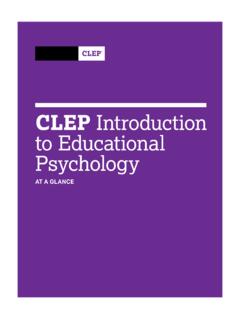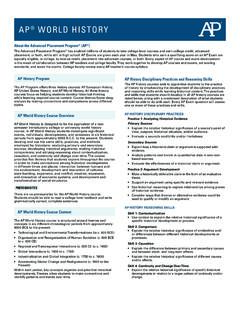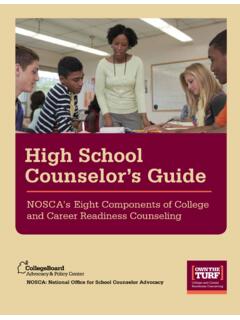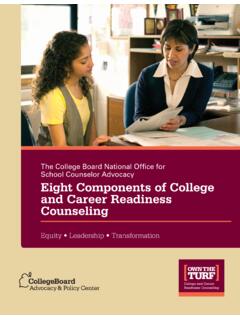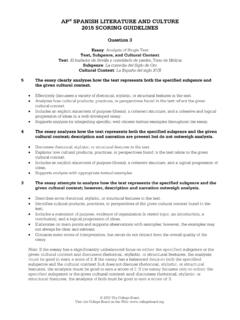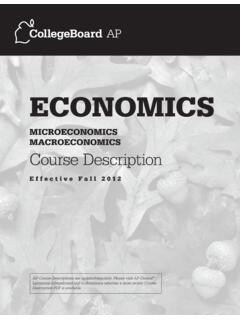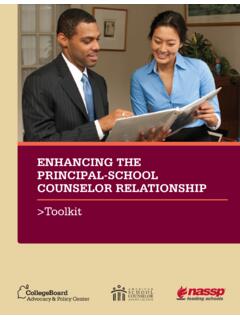Transcription of Human Growth and Development: At a Glance - College Board
1 Human Growth and Development: At a Glance Description of the Examination The Human Growth and Development examination (Infancy, Childhood, Adolescence, Adulthood and Aging) covers material that is generally taught in a one-semester introductory course in developmental psychology or Human development. An understanding of the major theories and research related to the broad categories of physical development, cognitive development and social development is required, as is the ability to apply this knowledge. The examination contains approximately 90 questions to be answered in 90 minutes.
2 Some of them are pretest questions that will not be scored. The questions on the clep Human Growth and Development exam adhere to the terminology, criteria and classifications referred to in the fifth edition of the Diagnostic and Statistical Manual of Mental Disorders (DSM-5). Knowledge and Skills Required Questions on the Human Growth and Development exam require candidates to demonstrate one or more of the following abilities: uKnowledge of basic facts and terminology uUnderstanding of generally accepted concepts and principles uUnderstanding of theories and recurrent developmental issues uApplications of knowledge to particular problems or situations The subject matter of the Human Growth and Development examination is drawn from the following categories.
3 For each category, several key words and phrases identify topics with which candidates should be familiar. The percentages next to the main categories indicate the approximate percentage of exam questions on that topic. 10% Theoretical Perspectives Biological Cognitive developmental Ecological Evolutionary Learning Psychodynamic Social cognitive Sociocultural 6% Research Strategies and Methodology Case study Correlational Cross-sectional Cross sequential Experimental Longitudinal Observational 12% Biological Development Throughout the Life Span Development of the brain and nervous system Genetic disorders Heredity, genetics and genetic testing Hormonal influences Influences of drugs Motor development Nutritional influences Perinatal influences Physical Growth and maturation.
4 Aging Prenatal influences Sexual maturation Teratogens 6% Perceptual Development Throughout the Life Span Habituation Sensitive periods Sensorimotor activities Sensory acuity Sensory deprivation 12% Cognitive Development Throughout the Life Span Attention Environmental influences Executive function Expertise 2 Information processing Jean Piaget s cognitive development theory Lev Vygotsky s sociocultural theory Memory Play Problem solving and planning Thinking Wisdom 8% Language Development Bilingualism Development of syntax Environmental, cultural and genetic influences Language and thought Pragmatics Semantic development Vocalization and sound 6% Intelligence Throughout the Life Span Concepts of intelligence and creativity Developmental stability and change Giftedness Heredity and environment Intelligence tests Reaction range 12% Social Development Throughout the Life Span Aggression Attachment Gender Interpersonal relationships Moral development Prosocial behavior Risk and resilience Self Social cognition Social learning and modeling Wellness 8% Family, Home and Society Throughout the Life Span Abuse and neglect Bronfenbrenner.
5 Urie Death and dying Family relationships Family structures Media and technology Multicultural perspectives Parenting styles Social and class influences 8% Personality and Emotion Attribution styles Development of emotions Emotional expression and regulation Emotional intelligence Erikson, Erik Freud, Sigmund Psychosocial theory Stability and change Temperament 5% Schooling, Work and Interventions Applications of developmental principles Facilitation of role transitions Intervention programs and services Learning styles Occupational development Operant conditioning Preschool care, day care and elder care Retirement 6% Developmental Psychopathology Antisocial behavior Anxiety and mood disorders Asocial behavior, fears, phobias and obsessions Attention-deficit/hyperactivity disorder Autism spectrum disorders Chronic illnesses and physical disabilities Cognitive disorders.
6 Including dementia Intellectual disability Learning disabilities Trauma-based syndromes 3 Study Resources Most textbooks used in College -level Human Growth and development courses cover the topics in the outline above, but the approaches to certain topics and the emphases given to them may differ. To prepare for the Human Growth and Development exam, it is advisable to study one or more College textbooks, which can be found for sale online and in most College bookstores. When selecting a textbook, check the table of contents against the knowledge and skills required for this test.
7 You may also find it helpful to supplement your reading with books and articles listed in the bibliographies found in most developmental psychology textbooks. Parents and others who work with children may have gained some preparation for this test through experience. However, knowledge of the basic facts, theories and principles of child psychology and lifespan development is necessary to provide background for taking the exam. A recent survey conducted by clep found that the following textbooks are among those used by College faculty who teach the equivalent course. You might find one or more of these online or at your local College bookstore.
8 UBerger, The Developing Person Through the Life Span (Worth) uBerk, Exploring Lifespan Development (Allyn & Bacon) uBerryman et al., Developmental psychology and You (Wiley) uBoyd and Bee, Lifespan Development (Allyn & Bacon) uBrown, Developmental psychology : A Course Companion (SAGE) uCraig and Dunn, Understanding Human Development (Prentice Hall) uFeldman, Development Across the Life Span (Prentice Hall) uHarris and Butterworth, Developmental psychology : A Student s Handbook ( psychology Press) uKail and Cavanaugh, Human Development: A Life-Span View (Wadsworth) uNewman and Newman, Development Through Life: A Psychosocial Approach (Wadsworth) uPapalia et al.
9 , Human Development (McGraw-Hill) uSigelman and Rider, Life-Span Human Development (Wadsworth) uSantrock, Essentials of Life-Span Development (McGraw-Hill) uSlater and Bremner, An Introduction to Developmental psychology (Wiley-Blackwell) uThornton, Understanding Human Development (Macmillan) The online resource below may help you study for your exam. However, it is not designed specifically to provide preparation for a clep exam. The College Board has no control over the content and cannot vouch for accuracy. \t _blank Tufts OpenCourseWare: PPM 100 Human Growth and Development: Course/35/Coursehome You can also find suggestions for exam preparation in Chapter IV of the Official Study Guide.
10 In addition, many College faculty post their course materials on their schools websites. Sample Test Questions The following sample questions do not appear on an actual clep examination. They are intended to give potential test-takers an indication of the format and difficulty level of the examination and to provide content for practice and review. For more sample questions and info about the test, see the clep Official Study Guide. 1. Charles is a businessman who made a great deal of money over the past 20 years. Throughout his life he has always been self-absorbed and competitive in his business dealings and in social settings. He is now 48 years old and has no spouse or children.
